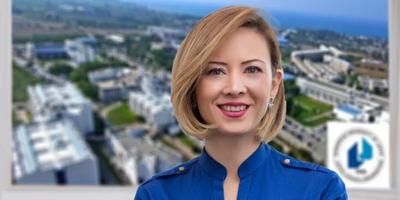EUL Academician Günebak conveyed information on “Palliative Care and Nutrition”
Palliative Care aims to increase the Life Quality of Patients and their Families
European University of Lefke (EUL) Faculty of Health Sciences Department of Nutrition and Dietetics Academician Assoc. Prof. Dr. Ç. Tuba Günebak conveyed detailed information on “Palliative Care and Nutrition”.
Günebak stated that, according to World Health Organization, palliative care is an approach that improves the quality of life of patients and their families facing the problem associated with life-threatening illness, through the prevention and relief of suffering by means of early identification and impeccable assessment and treatment of pain and other problems, physical, psychosocial and spiritual. Günebak said that, “Palliative care, in other words, is the care process in which the quality of life of a patient who has no chance of treatment is improved”, and added that the purpose of palliative care is not to diagnose the disease or to cure the primary disease, to eliminate the pain and symptoms of the incurable diseases and to improve the quality of life of the patients and their families.
Günebak: Patients’ quality of life is reduced if symptoms are not interfered
Günebak said that, “Pain, malnutrition and respiratory failure are the leading causes of palliative care need” and added that if the symptoms such as pain, nausea / vomiting, malaise, nourishment and cachexia which occur in the process of prolonging the life time in palliative care are not treated, patients’ quality of life will reduce.
Günebak pointed out that the most important problem of palliative care patients’ innutrition or malnutrition and added that “Because if the patient is nourished, the risk of malnutrition reduces, and physical function and emotional health increases”. Günebak stated that, in the conducted researches, it is observed that, with palliative care, pain, fatigue, insomnia, loss of appetite and lack of well-being of patients’ are relatively reduced.
Günebak: The need for energy and nutrients in a patient receiving palliative care is quite different from a healthy individual
Günebak said that, in this process, high quality nutrition increases the patient’s general well-being, strengthens the immune system, reduces the risk of infection, minimizes the complications of the disease, and accelerates the wound healing and tissue repair. Pointing out that the need for energy and nutrients in a patient receiving palliative care is quite different from a healthy individual, Günebak emphasized that the patient’s pain should be relieved and their mental, social and emotional problems should be solved in order to increase the consumption capacity in cases where the patients have oral intake. Günebak said that, the reason of loss of appetite (anorexia) in patients with oral intake is often due to depression or anxiety and added that in such condition appetite boosters could be used. Günebak said that, weight loss could develop due to oral intake being reduced or decreased, and in such condition patients’ intake of macro nutrients should be higher than healthy adult individuals, especially protein intake.
Günebak said that, “To sum up, palliative care is the total of treatments for improving the quality of life of patients and their families. In patients receiving palliative care, nutritional status should be evaluated and supplemented if necessary”. Günebak said that nutrition is vital for the palliative care patients and emphasized that what is important is to demonstrate nutritional levels of patients through nutritional screening tests and to initiate appropriate nutritional support within the first 24 hours. Günebak finally said that, as a result of the reflection of current scientific studies on practical applications in the field of health, residual life is prolonged.

